Once Upon A Time In Bristol (The Wire, October 2007)
BRISTOL BLUES AND ROOTS
Born in the multiracial mash-up of it's riotous inner city zone St Pauls, Bristol's music scene fused a potent brew of reggae and punk, wrapped itself in maternal bass for protection and sailed into the future with Smith & Mighty, The Wild Bunch and more.
Words: Peter Webb
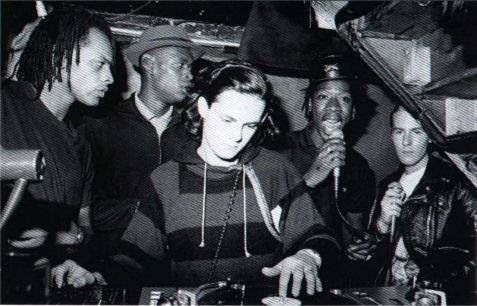
1985
For anyone remotely involved in the music or subcultural life of Bristol during the early to mid-1980s, the Dug Out Club featured large on the nightlife radar. The tiny basement bar was a magnet for anyone looking for a unique late night vibe. You could encounter a DJ mash-up of punk, soul, funk, jazz. Rare Groove and early hiphop (thanks to the first Kiss FM and WBLS tapes brought back from New York), or watch a selection of cult films and music promos in the video lounge upstairs. The club was on Park Row, near the main University buildings on a hill just above the city centre, marking a transitional point between the poorer, racially mixed districts of St Pauls, Easton and Southville and the more affluent areas of Clifton, Redland and Cotham. Bristol's hilly geography means that the central areas of the city are stacked up in close proximity, bringing communities from diverse social and cultural backgrounds together in day to day living space. The Dug Out was a melting pot of people from all over the city: punks, soul boys and girls, Rastas, Afro-Caribbeans, students and 'Clifton trendies'; artists, musicians, drinkers and assorted misfits. More significantly, it was also a meeting point for many of the individuals who became the architects of Bristol's dance music. The resident DJ in 1982 was Grant Marshall, later Daddy G of Massive Attack, and the collective he was part of. The Wild Bunch, joined him in a regular slot that lasted up to 1986. As well as Marshall, a tall, wiry and imposing Afro-Caribbean, The Wild Bunch featured Nellee Hooper, a young babyfaced white kid soon to join Soul II Soul; Miles Johnson, also known as Milo; Andrew Vowles, later known as Mushroom, another future Massive Attack member; rapper and MC Robert Del Naja, aka 3D, a graffiti artist also to feature in Massive Attack; and Claude Williams, aka Willie Wee.
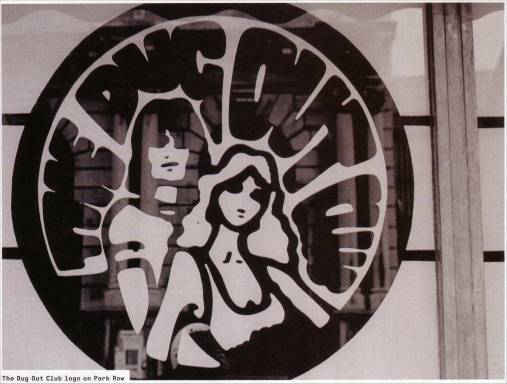
At the Dug Out, Bristol's unique combination of close-knit communities and openminded attitudes created a musical space focused on experimentation, which refused to accept genre boundaries. Here, people mixed up hiphop, funk, soul and dub, with the occasional punk or post-punk tune thrown in. And albums like The Clash's London Calling (1979) and Sandinista! (1980) became influential turntable hits because of their potent brew of reggae, dub, disco and punk.
Positioned astride the River Avon, Bristol is the effective capital of the West Country. For hundreds of years it made its living from the sea, with organisations like the city's secretive Society of Merchant Venturers being instrumental in making Bristol's port a vital node in the transatlantic slave trade during the 18th century. Philanthropic donations by Merchant Venturer Edward Colston (1636-1721) have left a distinct mark on the city's architecture and culture. The Colston Hall, for example, a former sugar warehouse named after him, is the city's largest concert venue; yet Massive Attack have steadfastly refused to perform there, and local musicians and artists have long campaigned to have it renamed in an attempt to erase its earlier associations with the slave trade.
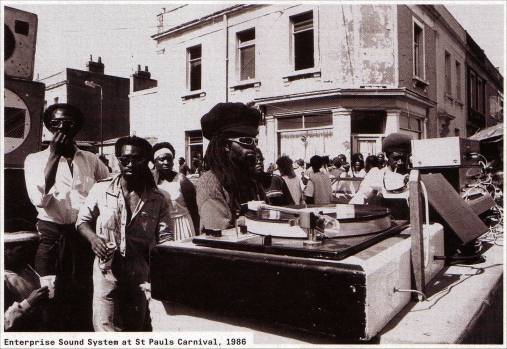
Much of Bristol's musical life of the 1980s centred on St Pauls, a relatively small district near the city centre combining decaying Edwardian splendour, large Georgian and Victorian housing and scattered high rise blocks of flats built in the 1960s. It is home to Bristol's Afro-Caribbean community, a white English and Irish working class as well as a significant squat/punk presence, and was immortalised by Ken Pryce, a middle class black student, whose book Endless Pressure outlined the diverse communities of St Pauls. The social tensions of the area came to a head when a riot erupted in 1980, after police clashed with youths following a 'stop and search' at the Black And White Cafe, where drugs were bought and sold. At the time, St Pauls was often portrayed as a no-go area. And indeed, it did have its fair share of criminal activity, racial aggression and hatred - there are varying accounts of the harmony (or lack of) within Bristol's melting pot of ethnicities and subcultures. But for youth it offered a cultural and social mix unique in the city, and the riot actually cemented the ties between young blacks, white punks and squatters, who all participated in the resistance to what they saw as police interference with their daily life. But for many years it was the music scene that enabled people to associate and mix freely. Apart from being the birthplace of Keith Tippett, Robert Wyatt and Evan Parker, among others, Bristol has been home to an incredibly healthy music scene since the late 70s, from punk and post-punk units such as Vice Squad, Disorder, Lunatic Fringe, Amebix, Chaos UK, The Pop Group, The Cortinas, Mark Stewart &The Maffia, Gary Clail, Rip, Rig & Panic, Float Up CP and Pigbag, to rock and post-rock groups such as Blue Aeroplanes, Brilliant Corners, Strangelove, Flying Saucer Attack, Movietone, Third Eye Foundation and Gravenhurst; jazz saxophonist Andy Sheppard; and later downtempo funk crews like Alpha, Way Out West, Monk & Canatella and Statik Sound System, and drum 'n' bass producers likeTech Itch, Decoder, Roni Size, Reprazent, Krust, Suv and Die.
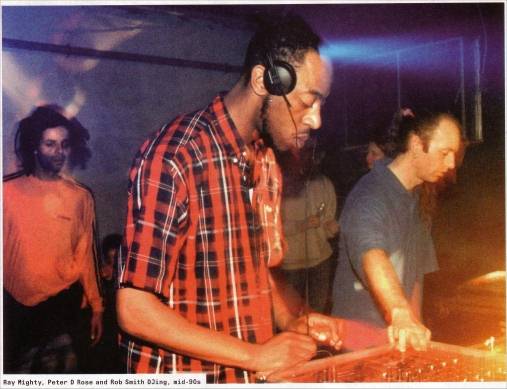
A crucial influence on the club scene for many years, and one whose contribution has often been left out of histories of Bristol's music scene, was the production duo of Smith & Mighty, aka Rob Smith and Ray Mighty. Smith started out as guitarist in a late 70s reggae group called Restriction, a tight melodic unit pumping out festival-friendly reggae, and featuring a young sound engineer called Dave McDonald, who would eventually, as an engineer with creative input, become the 'fourth member' of Portishead. Ray Mighty was well known in St Pauls among black and white youth into reggae and punk. He got together with Rob in the mid-80s to form a traditional Jamaican-style reggae system called Three Stripe, with a big posse of mates helping out.
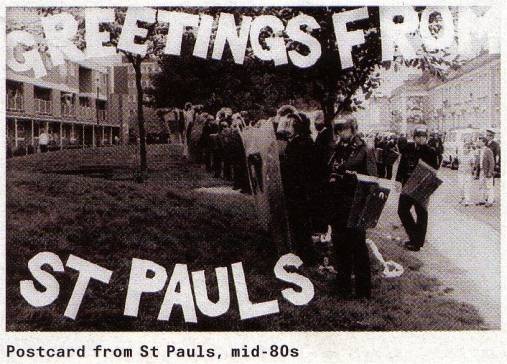
By night, St Pauls resounded to mash-ups of dub, punk, new wave, post-punk and, later, hiphop and soul, but the most constant sound played out in the area was reggae. Dub and roots reggae events took place in venues such as the Bamboo Club, ,the Dockland Settlement, Blue Lagoon, Malcolm X Centre, or in the many unlicensed 'blues' (aka shabeens - illegal late night drinking venues, often in somebody's basement) at bars such asAjax. Sound systems were central to the scene, with Bristolians responding enthusiastically to the trance-like intensity of visiting systems such as Jah Shaka, Saxon and Mad Professor. Homegrown systems like Roots Spot Crew, Kama Dread, Addis, Henry & Louis and Armagideon also provided much of the foundation-shaking bass.
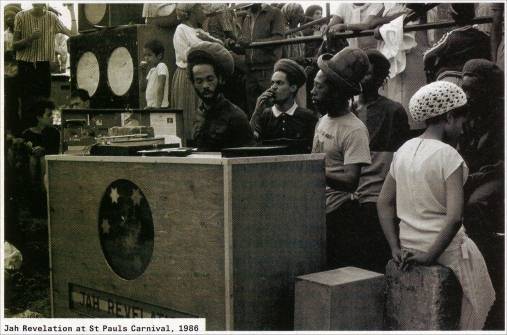
White reggae aficionado Andy Scholes originally had a sound system called Red Eye Hi Power and later went on to form the dub and conscious sound system Henry & Louis with Jack Lundy, another white reggae obsessive. The duo named themselves after slang for weights of dope: an eighth (a 'Henry') and a 16th (a 'Louis'). But Talisman were the first successful Bristol reggae group. Consisting of three black and two white members, their mix of styles and instrumentation prefigured Bristol's future musical blends. For instance, their track "Run Come Girl" (Recreational 1981), used a harmonica as a lead instrument, unheard of in reggae up to that point. Even so, they were ignored outside Bristol until UB40 took them under their wing. The fusion heard on "Run Come Girl" had a major impact on fellow local musicians.
Another Bristol group. Black Roots, released ten albums over 12 years and named John Peel among their admirers. "If anyone tells you there is. no such thing as good British reggae," Peel once said, "first tell them they are a herbert and then listen to Black Roots."
As well as reggae, punk and the fast developing post-punk scene of the early 1980s played an important role. Squat punk anarchy made its own mark in St Pauls at a venue plus cafe and bookshop called the Demolition Diner. This sat on the corner of Ashley Road and Stokes Croft, straddling St Pauls and Montpelier. Bristol punk was spearheaded by Lunatic Fringe, Disorder and Chaos UK, inspired by the communal activities of Crass and the nihilistic thrash of The Sex Pistols; the post-punk of Vice Squad and The Amebix; and a whole raft of units centred around Bristol's Riot City label. Allied with punk rock's anti-authoritarianism, Bristol's musicians tended to nurture a fierce sense of independence, preserving a healthy disrespect for the London based industry at the other end of the M4 motorway. That attitude was taken up and continued among the variegated tribes that congregated at the Dug Out.
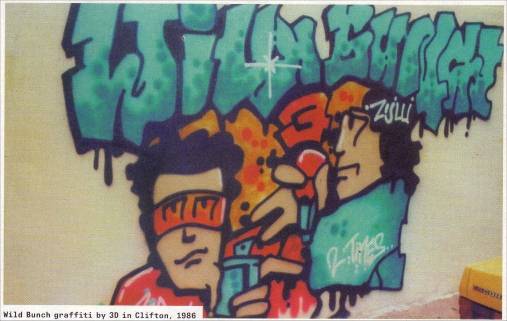
The city's unique cultural geography remained largely unrecognised outside its boundaries, however, until the 1990s, when the notorious tag 'triphop' was coined by Mixmag to describe the kind of moody, downtempo music production which by then, had developed around Bristol acts such as Massive Attack, Portishead and Tricky. Even then, you could enter the town and find little trace of the scene. Rather than conventional nightclubs, it was in offbeat pubs and bars and small clubs that acted as key venues. Telltale signs of bass-heavy vibes could be heard emanating from late night blues or clubs like the Western Star Domino Club, the Tropic Club, the Moon Club, the Green Rooms, The Rummer, Shoots Tiffanys or the Dockland Settlement - makeshift social spaces that have since become car parks, restaurants, hairdressers or bars.
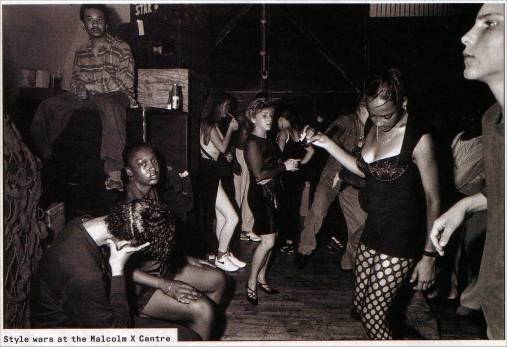
For Smith & Mighty and Three Stripe Posse, bass was not just part of the musical landscape but the main component of their production style. For these Bristolians, the bass in question was the enwombing low end pressure felt in dub sides by Scientist, Prince Jammy and King Tubby. When Smith & Mighty wrote "Bass is maternal... When it's loud I feel safer", on their first album Bass Is Maternal (More Rockers 1995), they were referring to the kind of warm, enveloping sub-bass that reverberated through your solar plexus and rose up through the ribcage. Where the later production work of Massive Attack, Portishead and Tricky combined epic string sections and lush keyboard sounds with treacly sub-bass, paranoid vocals and sinister samples-juxtaposing spliffed out horizontal bliss with edgy angst - Smith & Mighty emphasised a more direct connection between their music and the dancefloor. They epitomised the Bristol party sound also promoted by The Wild Bunch, Three Stripe and 2 Bad Crew, what with their mixture of breaks, dub bass, soul and funk melodies and dub reggae effects. In addition, their words addressed Rastafarian politics of peace, love and unity. The first Massive Attack album Blue Lines (1991) had some of these elements, but tracks like "Safe From Harm" also presented an edgier, darker side that reflected Robert del Naja and Tricky Kid's experiences of Bristol's inner-city breakdown.
As the 1980s progressed. Smith & Mighty honed their production skills, utilising early drum machines like the Roland 808, four-track tape recorders, reel-to-reel Revox recorders, mixing desks and a variety of keyboards. They particularly liked the early Casio FX1 sampler for its ten-second sampling facility, which today you can get from most children's toys. They also deployed the incredible sub-bass sounds of the Roland SH101. Smith & Mighty's Three Stripe crew became an important production unit, cutting tracks for DJ crews like 2 Bad and UD4 to play out. In 1987 their skills were utilised by a young Massive Attack, who had risen from the ashes of the disbanded Wild Bunch. After their DJ slot at the Dug Out, The Wild Bunch graduated to making music, but two singles for Fourth & Broadway, "Friends And Countrymen" and "The Look Of Love", had failed to sell, and Nellee Hooper moved on to London's Soul II Soul collective, while DJ Milo left the country. The surviving Wild Bunch members - Mushroom, Daddy G and 3D - returned to Bristol and set up Massive Attack. Released on their own Massive Attack Records in 1987, their first single, "Any Love", featuring Daddy G and Carlton on vocals, was produced by Smith & Mighty. More uplifting in feel and tempo than later Massive tracks, the clean production sits on a rough bass-heavy breakbeat with an instantly recognisable reggae-tinged low end. Smith & Mighty also produced a version of Erik Satie's Gymnopedie No 1, which layered the exquisite piano melody on top of a compressed and heavy breakbeat with an Acidic bassline bubbling away underneath. Mark Stewart took the track and added a new vocal, cutting up Stephen Sondheim's lyrics to "Somewhere", and retitling it "Stranger Than Love", for his 1987 album Mark Stewart.
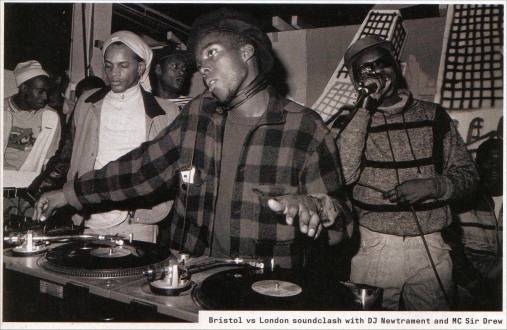
Much has been written about the three most successful artists to arise out of this fertile period in the late 1980s and early 1990s: Massive Attack, Portishead and Tricky. As their careers developed, they moved away from the music of the club space to a more intense, angst-ridden and suffocating aural world, which they sat on top of a blissful mix of strings, hypnotic breakbeats and minor-key melody.
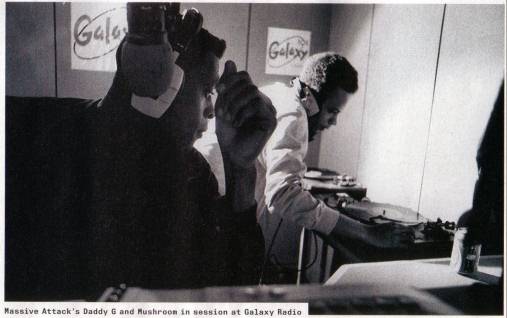
After co-producing Massive Attack's first single, Smith & Mighty produced two tracks that would be played all over the UK, laying the foundations for their reputation as a key British dance production team. "Anyone (Who Had A Heart)" (1987) was the first of two Bacharach/David covers they produced with local singer Jackie Jackson, who emerged from Bristol's Jamaican community. Her soul-tinged voice glides effortlessly over the drastically changed backing track, where a heavy bass drum kick and thundercrack snare provide a platform for its jangling-bell melody, while a bubbling bassline warps the instantly recognisable Bacharach tune. Here, Smith & Mighty had Grafted a slice of downtempo hiphop which utilised dub reggae techniques and soul/soundtrack type emotion, even dipping into Acid House for the bass sound.
A follow-up Smith & Mighty single, "Walk On By", took their bass-heavy formula into even more exalted territory, attracting the attention of major labels. But, armed with a punk attitude and mistrusting big business. Smith & Mighty turned down offers from Virgin, among others, before . eventually signing to London Records subsidiary FFRR in 1990. Although the deal did not deliver the anticipated chart success, it at least brought them a steady stream of remix and production work for artists such as Beats International, Movement 98, Blow, Neneh Cherry and The Ragga Twins. They also produced Carlton's album The Call Is Strong (London 1990), which is often described as the lost gem of the Bristol music scene, as well as British top ten hit "Wishing On A Star" by Bristol's Fresh Four, containing a young DJ Krust and Suv, later of Bristol's Full Cycle Jungle crew, and fellow drum 'n' bass artist Flynn, of Flynn & Flora. But FFRR kept on rejecting Smith & Mighty's own album, claiming it was too complex and diverse. Further, it lacked an obvious single.
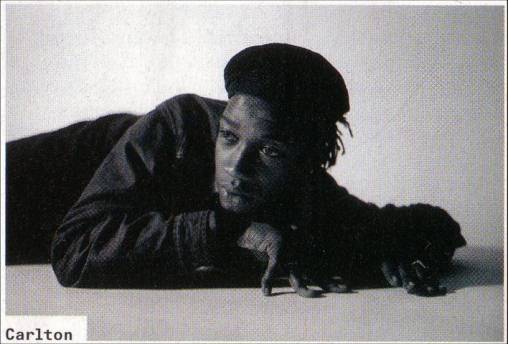
After this commercial disappointment. Smith & Mighty retreated to their bass-heavy roots. In 1992 they released the Steppers Delight EP on their own Three Stripe imprint, with FFRR's blessing. It showcased Smith & Mighty's links with the emerging Techno and breaks scenes, with "Killa" combining high-speed breaks and a punchy bassline. FFRR were hoping for more of the kind of languid Bacharach covers that Smith & Mighty had produced at the end of the 80s, but the duo were more interested in immersing themselves in a rapidly changing British dance scene. After four frustrating years, they left the label acrimoniously in 1994 without having released any of their own material. Setting up their More Rockers imprint, they finally released their own record. Bass Is Maternal, which provided a link between the past, present and future of the Bristol dance scene. With its backwards distorted guitar and breakbeat, ghostly keyboard and a vocal that sounds as if it is being sucked backwards through an empty cave, the opening "Hold On" created an atmosphere unlike anything you might have expected from the duo who had produced "Walk On By". Tracks like "Jungle Man Corner", "Evolve" and "Drowning" explore sonic areas that anticipated drum 'n' bass and Hardcore, while others reaffirmed their connections to reggae spiritualism: "Give praise to birth and accept all contrasts/What will be will be" (from "Accept All Contrasts"). The album foregrounds the bass, but plays about with heavy, distorted drum sounds and keyboard melodies that are juxtaposed with ghostly backwards guitar effects and feedback. Bass Is Maternal experiments and moves through genres and soundscapes in the tradition of dub reggae producers like King Tubby, Dennis Bovell and Scientist and post-punk experimenters like Public Image Limited.
As a DJ, Rob Smith kept a close watch on the unfolding developments of dance music. As the 1990s progressed, so did his love of drum 'n' bass. He started a crew called More Rockers with Peter D Rose, another collaborator from Bristol and sometime member of Smith & Mighty. More Rockers unleashed a series of albums: three volumes called Dub Plate Selection over a period of nine years, and a collaboration with Los Angeles based singer Angel as Jaz Klash, Thru The Haze (Cup Of Tea 1996). Their DJing, accompanied by a variety of Bristolian MCs, has taken them all over the planet, and their persistence has stamped an authoritative mark on the drum 'n' bass scene. The duo, meanwhile, maintained their links with the old blues scene with a reggae- and soul-tinged take on drum 'n' bass that morphed the melodic elements of reggae with Hardcore breakbeats. More unusually for early drum 'n' bass, they grafted song structures over the riddims (see their 1995 version of Ewan MacColl's "The First Time Ever I Saw Your Face").
In 1998, after drum 'n' bass's golden age had come to an end. Smith & Mighty released a DJ Kicks mix album for the Studio K7 label that reaffirmed the Bristol connection by including only fellow Bristolians: DJ Lynx (of3PM), Ratman (also known as Receiver), Wilks, Andy Scholes, Flynn & Flora and Wraparound Sounds. An album. Big World, Small World, followed in 1998. Their most successful record, its overwhelming feel is a quintessential Bristol mix of roots reggae, with lovers rock lyrics over clean polished beats and sub-bass. The Bristol sound has been described as possessing a darkness that is uplifting, a joyful melancholy, and this contrast of light and shade can be heard on Big World, Small World. Featuring . a moody, angelic vocal from Tammy Payne over an insistent bass heavy drum break, wandering bassline and filtered keyboard, "Same" sums up the album's mood perfectly. Its vocal line provides an introspective, melancholic statement of daily drudgery and a plea to "help me I'm merging into all" and "everything is turning out the same". 5- The track became one of Smith & Mighty's most ^ successful singles, as well as being one of their | most haunting tunes.
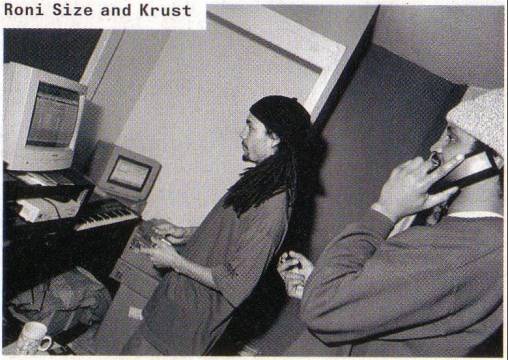
Over the course of the 1990s, the Bristol drum 'n' bass scene became one of the most influential ": in the UK, with the rise of Roni Size and the Reprazent crew, their Full Cycle record label, and Smith & Mighty acolytes like Krust, Die and Suv becoming artists in their own right. More Rockers' take on drum 'n' bass reconnected the music to the reggae, dub and breaks axis that helped define St Pauls music culture. Their 1996 version of Diana Ross's "Love Hangover" was the very essence of a Bristol track - a combination of a bittersweet soul vocal and a rolling, aggressive drum 'n' bass pattern.
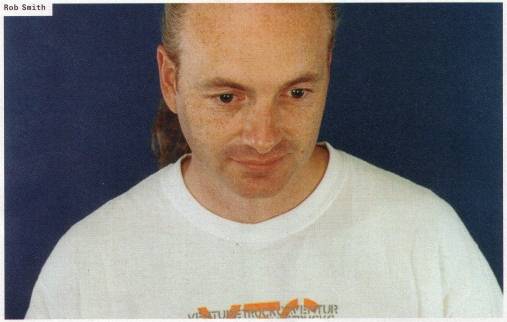
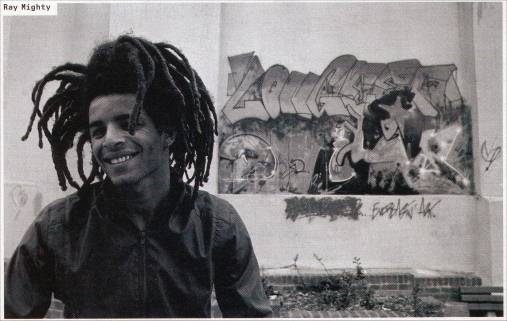
Through all their years together, the trajectory of Smith & Mighty and More Rockers has acted as a thread connecting all the elements of Bristol's dance scenes. Today, the city harbours a new generation of cutting edge dubstep producers. The Punch Drunk label is based in one of the few remaining independent record shops, Rooted Records on Gloucester Road, and is home to such Bristol based dubsteppers as Gatekeeper, Joker and Monkeysteak, who cite Smith & Mighty and More Rockers as key influences. DJ Pinch's Techtonic label has also benefited from the help and suppor of Rob Smith. Smith himself is still exploring new sounds, astounding crowds with his DJing. He currently has a dubstep project entitled RSD, where his eclectic musical signatures of heavy bass, breakbeat construction and deconstruction can filter around ghostly dub Ambience, guitar chops and delayed effects, with occasional vocals floating into the mix. Ray Mighty took time out to raise his children in the past few years, but is slowly returning to the fold as a DJ and remixer.
The Dug Out, however, has long since disappeared - it was converted into a Thai restaurant in 1987. The social mix in Bristol has also changed: there are no longer the music tribes and subcultures that existed in the 1980s, but the sense of adventure and experimentation remains. The Cube Cinema hosts experimental music nights; club spaces like Native, The Tube, The Black Swan and The Croft are the new 'mash-up' destinations. Massive Attack and Portishead are still active, and the dubstep scene nods its hat in deference to Smith & Mighty.
Peter Webb's Exploring The Networked Worlds Of Popular Music: Milieu Cultures is published this month by Routledge.








